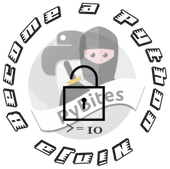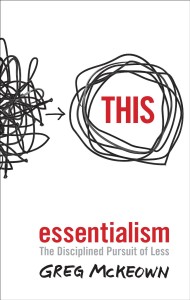We buy things we don't need, to impress people we don't like.
Tyler Durden (Fight Club)
I just finished Essentialism: The Disciplined Pursuit of Less. Here are some things to ponder over:
- A lot of essentialism is to become focussed on what matters most. This takes practice. One good advice I found in the book is to ask yourself the following question while doing any particular task: “Is this the very most important thing I should be doing with my time and resources right now?” or “Will this activity or effort make the highest possible contribution towards my goal?”
- Define what you want and prioritise your life. Not doing this has a double cost: not only will you not advance, you also are subjected to the whims of other people who will plan your life for you.
- The Essentialist thinks in: “I choose to,” “Only a few things really matter,” and “I can do anything but not everything.”
- Learn to say NO. There is always too much to do, read, learn. However only a few things matter. Watch out for the trap of “decision fatigue”: the more choices we are forced to make, the more the quality of our decisions deteriorates. As Derek Sivers says: No more yes. It's either HELL YEAH! or no.
- The importance of sleep. Sleep is the driver of peak performance. Lack of sleep has a detrimental effect on your health and productivity: you cannot think clearly, you cannot prioritise (fundamental essentialist skill!). To learn more about the science of sleep, check out Night School (Richard Wiseman).
- Disconnect. The book states "We need space to escape in order to discern the essential few from the trivial many.” - too much routine and we get stuck. Sometimes we have to step outside. You remember how clear your mind was after that last trip abroad?
- Less is more. These days we have more information, but less knowledge. Quality lays in doing a few things very well, rather than a lot of things half-assed.
- Essentialism is not about how to get more things done; it’s about how to get the right things done. As Stephen R. Covey said: “If the ladder is not leaning against the right wall, every step we take just gets us to the wrong place faster.”
- To advance in your career it usually boils down to: “What would happen if we could figure out the one thing you could do that would make the highest contribution?” - usually there is one or a few critical things, spot them. Use Pareto’s principle to guide you: what 20% of the effort is producing 80% of the results? Further reading: The 80/20 Principle by Richard Koch.
- Eliminate. Essentialists invest the time they have saved into creating a system for removing obstacles and making execution as easy as possible. One trap the book describes is our sunk-cost bias: "studies have found that we tend to value things we already own more highly than they are worth and thus that we find them more difficult to get rid of". Elimination is not only limited to material things. We should avoid time wasters, automate, and delegate where possible. Refer to the 4 hour work week for practical advice.
- Lack inspiration what to work on next? The books gives us 3 questions for determining where to put our time and effort towards: “What do I feel deeply inspired by?”, “What am I particularly talented at?” and “What meets a significant need in the world?”. For me similar questioning led to prefer a career in Software Development over Finance (my degree) = passion, talent and market demand combined.
- "Every day do something that will inch you closer to a better tomorrow.” said Doug Firebaugh. How do you eat an elephant? One bite at a time. Long term goals may seem overwhelming. Building an Android app with little experience surely was for me. Yet, when dividing it in subtasks (small wins), the app came to life and I was surprised how fast it was coming along. Moreover, small wins create momentum, you become unstoppable. Same with getting into physical shape: it does not happen overnight, but putting the disciplined work in every day you start to see significant results soon and you just keep going. Persistence and repetition are very powerful skills!
Essentialist quotes
“Tell me, what is it you plan to do / with your one wild and precious life?”
- Mary Oliver“You cannot overestimate the unimportance of practically everything.”
- John MaxwellA non-Essentialist thinks almost everything is essential. An Essentialist thinks almost everything is non-essential.
- Greg Mckeown (link contains other quotes from the book)"I do believe in simplicity. It is astonishing as well as sad, how many trivial affairs even the wisest
thinks he must attend to in a day; how singular an affair he thinks he must omit. When the mathematician would
solve a difficult problem, he first frees the equation of all incumbrances, and reduces it to its simplest terms.
So simplify the problem of life, distinguish the necessary and the real.
Probe the earth to see where your main roots run."
- Henry David Thoreau“People are effective because they say ‘no,’ because they say, ‘this isn’t for me’.”
- Peter Drucker“If one's life is simple, contentment has to come. Simplicity is extremely important for happiness.
Having few desires, feeling satisfied with what you have, is very vital: satisfaction with just enough food,
clothing, and shelter to protect yourself from the elements. And finally, there is an intense delight in
abandoning faulty states of mind and in cultivating helpful ones in meditation.”
- Dalai Lama
- essentialism (1) ,
- essentialist (1) ,
- focus (3) ,
- less is more (1) ,
- pareto (2) ,
- productivity (10) ,
- self-development (2) ,
- sleep (2)

